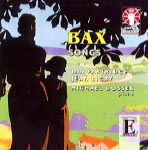Although it’s unlikely that many listeners were clamoring for a whole disc of songs by Arnold Bax, anyone who loves English song repertoire and appreciates fine singing should be grateful for the opportunity provided by Dutton and these three first-rate performers. Although Bax wrote most of these pieces–to poems by his brother Clifford and cousin Freda, as well as A.E. Housman, Thomas Hardy, William Sharp, James Cousins, and even by Bax himself–in his younger years, they show an exceptionally well-developed sense of vocal technique, a grasp of how to create effective piano accompaniment that both supports the voice and enlarges the expressive picture, and an imaginative ear for text-setting. His writing generally shows a melodic style as free and original as the words it complements, with accompaniments as interesting as the vocal lines–and although these piano parts are almost invariably independent and often virtuosic, they remain vital to the mood and expressive character of the texts. There is little repetition of material throughout a song, so you really have to stay around until the very end to “see what happens”. Some of the songs (the disc-openers “Youth” and “Parting”, for instance) have intriguing introductions that give no clue to the melody to come, but what emerges flows naturally and easily so that we can imagine no other possible tune. Perhaps Bax’s best-known song, The White Peace, offers a lovely melody whose most endearing feature is a surprising little shift of line and harmony that takes us from the routine to the unusual, from merely pleasing to “I’ve got to hear that again”.
The singing, shared by tenor Ian Partridge and mezzo Jean Rigby is excellent, although Rigby occasionally shows some strain and wear in her upper-most range. Michael Dussek’s piano is always where it needs to be, effectively leading in the intros and interludes and leaving the stage bathed in just the proper mood after his occasional song-ending solo codas. The sound is fine, even though the bright upper-register piano tone (listen to the rapid-passage sections in “The Fairies”, for instance) contrasts unfavorably with the rest of the instrument’s otherwise evenly balanced, mellifluous timbre.
Ultimately, this proves to be a very enjoyable and worthwhile 78 minutes–and because of the songs’ close associations with events in Bax’s personal life, listening to them (in conjunction with the informative commentary by Lewis Foreman) offers a fascinating perspective for those wishing to better understand this important composer while highlighting interesting clues to the origins of some of his later orchestral works. Highly recommended. [6/4/2004]
































